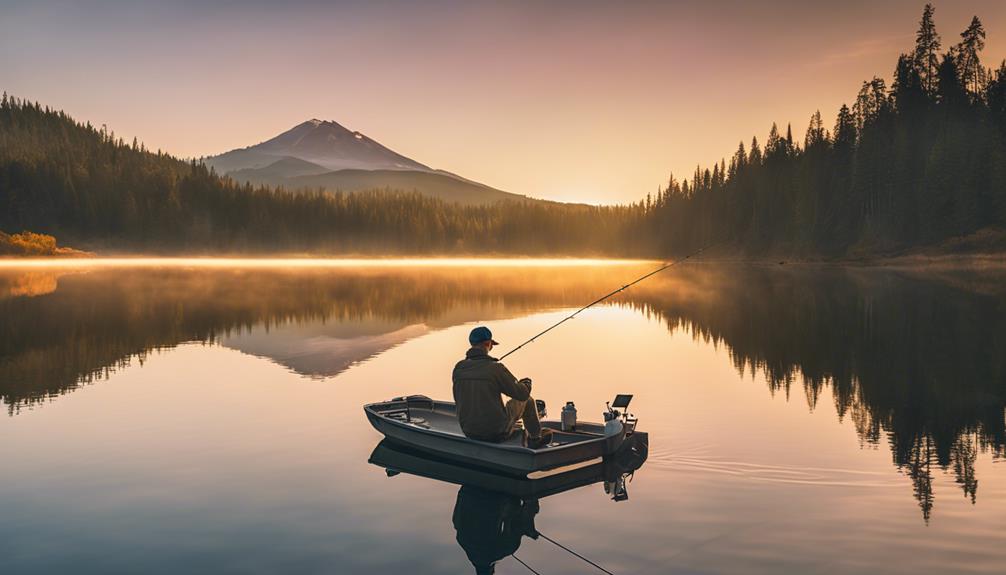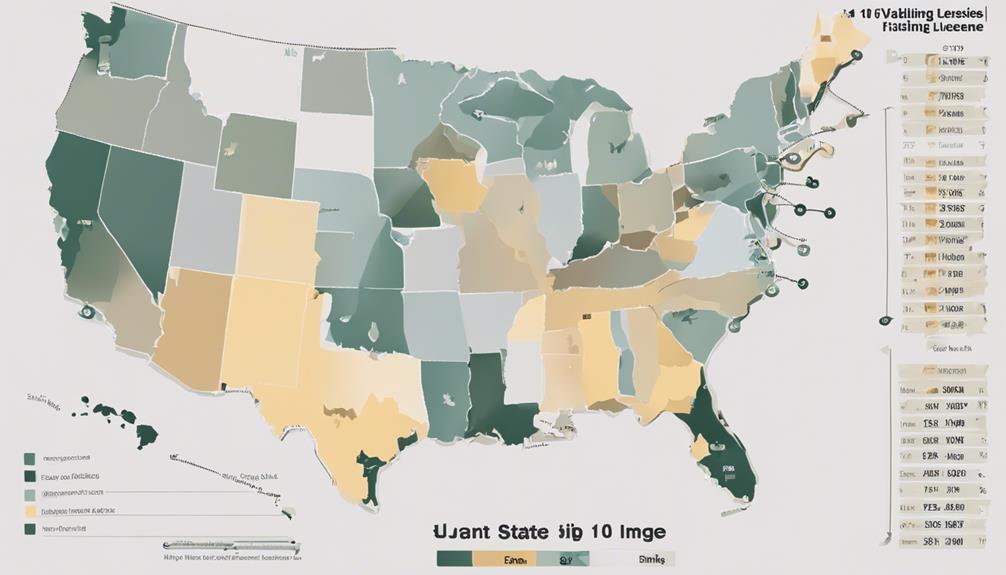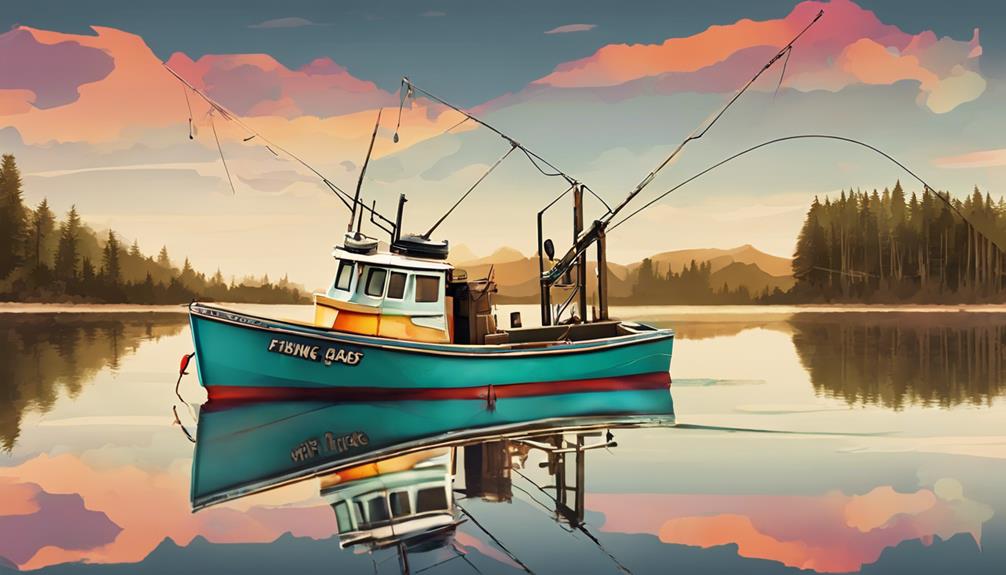Have you ever wondered if acquiring a non-resident fishing license in Oregon could enhance your angling experiences?
Discovering the ins and outs of fishing licenses tailored for non-residents might just be the key to unlocking new fishing opportunities in the Beaver State.
Non-Resident Fishing License Overview
If you're planning to fish in Oregon as a non-resident, you'll need to obtain a non-resident fishing license. Oregon offers a plethora of fishing locations, from picturesque rivers to serene lakes, ensuring you'll have plenty of options to explore. Each location may have specific catch limits in place to help maintain the fish population and ecosystem's balance. It's crucial to familiarize yourself with these regulations before casting your line.
Before heading out to your chosen fishing spot, make sure to check the catch limits set for that particular area. These catch limits specify the number and size of fish you're allowed to catch and keep. Adhering to these limits isn't only a legal requirement but also contributes to sustainable fishing practices. By respecting these regulations, you play a vital role in preserving Oregon's aquatic ecosystems for future generations to enjoy.
Whether you prefer the tranquility of a mountain stream or the vast expanse of a coastal bay, Oregon's fishing locations cater to a variety of preferences. From trout to salmon, the state's waters are teeming with diverse fish species waiting to be caught. Remember, while enjoying the thrill of fishing in Oregon, always prioritize conservation by following catch limits and practicing responsible angling techniques.
Types of Non-Resident Licenses
Explore the variety of non-resident fishing licenses available in Oregon to ensure you have the proper authorization for your fishing adventures. When obtaining a non-resident fishing license in Oregon, it's essential to understand the different types offered to comply with license restrictions and seasonal limitations.
Non-resident fishing licenses in Oregon typically include options for short-term or annual permits. Short-term licenses are suitable for visitors planning a brief fishing trip, while annual licenses cater to those who frequent the state for fishing activities throughout the year. Each type of license comes with its own set of restrictions and seasonal limitations to ensure compliance with Oregon's fishing regulations.
License restrictions may vary based on the type of non-resident license purchased. For example, certain licenses may limit fishing in specific areas or for certain species of fish. Understanding these restrictions beforehand can help you plan your fishing trips more effectively and avoid any legal issues while enjoying Oregon's abundant fishing opportunities.
Seasonal limitations are another crucial aspect to consider when selecting a non-resident fishing license. Some licenses may only be valid during certain times of the year, aligning with fishing seasons and conservation efforts. Being aware of these seasonal limitations will allow you to make the most of your fishing license while respecting Oregon's natural resources.
Fishing Regulations for Non-Residents
Understanding the fishing regulations for non-residents in Oregon is crucial for compliance with state laws and conservation efforts. When fishing in Oregon as a non-resident, it's essential to adhere to the following guidelines:
- Catch Limits: Non-residents must be aware of the catch limits set by Oregon's Department of Fish and Wildlife. These limits are in place to ensure sustainable fishing practices and the preservation of fish populations. Exceeding catch limits can result in fines and penalties, so it's important to familiarize yourself with the specific regulations for the water bodies you plan to fish in.
- Conservation Efforts: Oregon places a strong emphasis on conservation efforts to protect its diverse aquatic ecosystems. Non-residents are expected to contribute to these efforts by following all regulations aimed at conservation, such as practicing catch and release when necessary, respecting wildlife habitats, and properly disposing of any waste generated while fishing.
- Special Regulations: Certain water bodies in Oregon may have special regulations that apply to non-resident anglers. These regulations could include specific gear restrictions, seasonal closures, or designated fishing zones. It's your responsibility to research and understand any additional regulations that may apply to the area you intend to fish in.
Purchasing Non-Resident Licenses Online
To purchase a non-resident fishing license online in Oregon, visit the official website of the Oregon Department of Fish and Wildlife. When buying your license through their online portal, you ensure convenient access to fishing in the state's waters. Non-resident fishing licenses in Oregon are valid for a specific duration, typically a year from the date of purchase. It's crucial to be aware of the expiration date to avoid fishing illegally.
The online platform offers various payment options for purchasing your non-resident fishing license. You can use major credit or debit cards to complete the transaction swiftly. This flexibility in online payment methods makes it easy for out-of-state anglers to acquire their licenses hassle-free. Additionally, the online system provides instant confirmation of your license purchase, allowing you to start planning your fishing trip without delay.
Non-Resident License Fees
When looking into purchasing your non-resident fishing license online in Oregon, gaining an understanding of the associated fees is essential. Here are some key points to consider regarding non-resident license fees:
- Out of State Fees: Non-residents should be aware that fishing license fees in Oregon can vary based on residency status. Out-of-state visitors typically pay higher fees compared to residents. These fees contribute to conservation efforts and help maintain the state's fisheries for all to enjoy.
- License Discounts: While non-resident fees are generally higher, there are certain discounts available that you may qualify for. Keep an eye out for promotional offers, special discounts for seniors or veterans, or multi-day fishing permits that could provide cost savings during your fishing trip in Oregon.
- Additional Costs: In addition to the base fishing license fee, there may be other costs to consider, such as additional permits for specific types of fishing or special areas. Make sure to review all the fees and permits required for your fishing plans to ensure compliance with Oregon fishing regulations.
Understanding the non-resident license fees in Oregon will help you plan and budget effectively for your fishing adventure in the beautiful waterways of this state.
Where to Display Your License
Ensure that your fishing license is prominently displayed while engaging in fishing activities in Oregon. Proper placement of your license is crucial for easy identification by authorities and compliance with state regulations. License visibility is essential to avoid any fines or penalties that may arise from not having your license displayed correctly.
When fishing in Oregon as a non-resident, the proper placement of your fishing license is typically on your outer clothing, above the waist, in a location where it's clearly visible. Many anglers choose to attach their license to a lanyard or clip it onto a pocket for easy access and visibility. This ensures that enforcement officers can quickly spot your license while you're fishing.
To maintain license visibility, make sure that the information on the license, such as your name, license number, and expiration date, is easily readable. Avoid placing your license in a location where it may become obscured by fishing gear or clothing. By following these simple guidelines for proper placement and visibility of your fishing license, you can enjoy your fishing experience in Oregon without any interruptions due to license issues. Remember, displaying your license correctly not only keeps you in good standing with the law but also helps in preserving the natural beauty of Oregon's fishing locations.
Non-Resident License Renewal Process

Make sure to renew your non-resident fishing license in Oregon before it expires to continue enjoying fishing legally in the state. Renewal reminders are typically sent out before your license expiration date, but it's essential to keep track of when your license needs to be renewed to avoid any lapses in legality.
Renewal Process for Non-Resident Fishing Licenses in Oregon:
- Renewal Reminders: The Oregon Department of Fish and Wildlife may send you renewal reminders via email or traditional mail as your license expiration date approaches. It's crucial to pay attention to these reminders to ensure you renew your license on time.
- License Expiration Dates: Non-resident fishing licenses in Oregon are typically valid for a specific period, such as one year from the date of purchase. Make a note of your license expiration date to plan ahead for the renewal process.
- Online Renewal Option: Fortunately, renewing your non-resident fishing license in Oregon is a straightforward process that can often be completed online. Take advantage of this convenient option to renew your license promptly and avoid any disruptions to your fishing plans.
Benefits of Non-Resident Licenses
Discover the advantages that come with holding a non-resident fishing license in Oregon. Non-resident licenses not only open up a world of fishing opportunities but also contribute significantly to the state's economy. By attracting fishing tourists from all over, these licenses play a crucial role in boosting Oregon's economic impact.
Fishing tourism is on the rise, and non-resident licenses cater perfectly to this growing trend. Visitors looking to enjoy Oregon's abundant fishing resources can easily obtain a non-resident license, allowing them to participate in the state's fishing activities legally. This accessibility encourages more tourists to visit Oregon specifically for fishing purposes, injecting revenue into local businesses and communities.
The economic impact of non-resident licenses extends beyond just the license fees themselves. Fishing tourists often spend money on accommodation, food, gear, and other recreational activities during their stay. This additional expenditure helps stimulate various sectors of Oregon's economy, supporting jobs and businesses that rely on tourism.
Moreover, the revenue generated from non-resident licenses can be reinvested into conservation efforts, ensuring the sustainability of Oregon's fisheries for future generations. So, not only do non-resident licenses benefit individual anglers by granting them access to Oregon's diverse fishing spots, but they also play a vital role in driving economic growth and supporting environmental conservation initiatives in the state.
Frequently Asked Questions
Can Non-Residents Purchase a Lifetime Fishing License in Oregon?
Yes, non-residents can purchase a lifetime fishing license in Oregon, offering great benefits and potential discounts. It's a convenient option for those who frequent the state for fishing.
With a lifetime license, you can enjoy fishing without the hassle of renewing permits regularly. Non-residents may also be eligible for discounts on these licenses, making it a cost-effective choice for avid anglers visiting Oregon.
Are There Any Restrictions on the Types of Fish Non-Residents Can Catch With Their License?
When fishing in Oregon as a non-resident, you must be aware of catch limits and species restrictions set by fishing regulations for conservation purposes. These rules dictate the types and amounts of fish you can catch with your license.
By following these guidelines, you contribute to preserving the natural resources and biodiversity of Oregon's waters, ensuring a sustainable fishing environment for all.
Remember to respect these regulations for the benefit of future generations.
Do Non-Residents Need to Bring Their Physical Fishing License With Them While Fishing, or Is a Digital Copy Acceptable?
When you head out fishing, it's crucial to have your license handy. Whether it's digital or physical, make sure you can easily verify it if needed.
Having your license on you helps ensure you're fishing legally and can avoid any potential issues.
Are There Any Special Permits or Additional Fees Required for Non-Residents to Fish in Certain Areas or for Certain Species?
When fishing as a non-resident in Oregon, you must be aware of any specific fishing regulations and potential additional fees in certain areas or for specific species.
Make sure to check for any required permits to fish in particular hotspots and consider supporting local conservation efforts.
Local fishing guides can offer valuable insights and help navigate any special requirements, ensuring an enjoyable and compliant fishing experience in Oregon's waters.
Can Non-Residents Transfer Their Fishing License to Another Person if They Are Unable to Use It?
If you can't use your fishing license, you may wonder about its transferability. Non-resident fishing regulations vary, so check the specific rules.
Some places allow transfers with certain conditions, like family members or in emergencies. Always read the fine print to understand the restrictions.
Keep in mind that not all locations permit fishing license transfers, so it's important to know the rules beforehand.
Conclusion
Now that you know more about non-resident fishing licenses in Oregon, you can easily purchase one online and start enjoying the state's beautiful fishing spots.
Remember to follow the regulations and display your license properly while fishing.
Renewing your license is simple, and the benefits of having a non-resident license include access to a variety of fishing opportunities in Oregon.
Get out there and cast your line!



